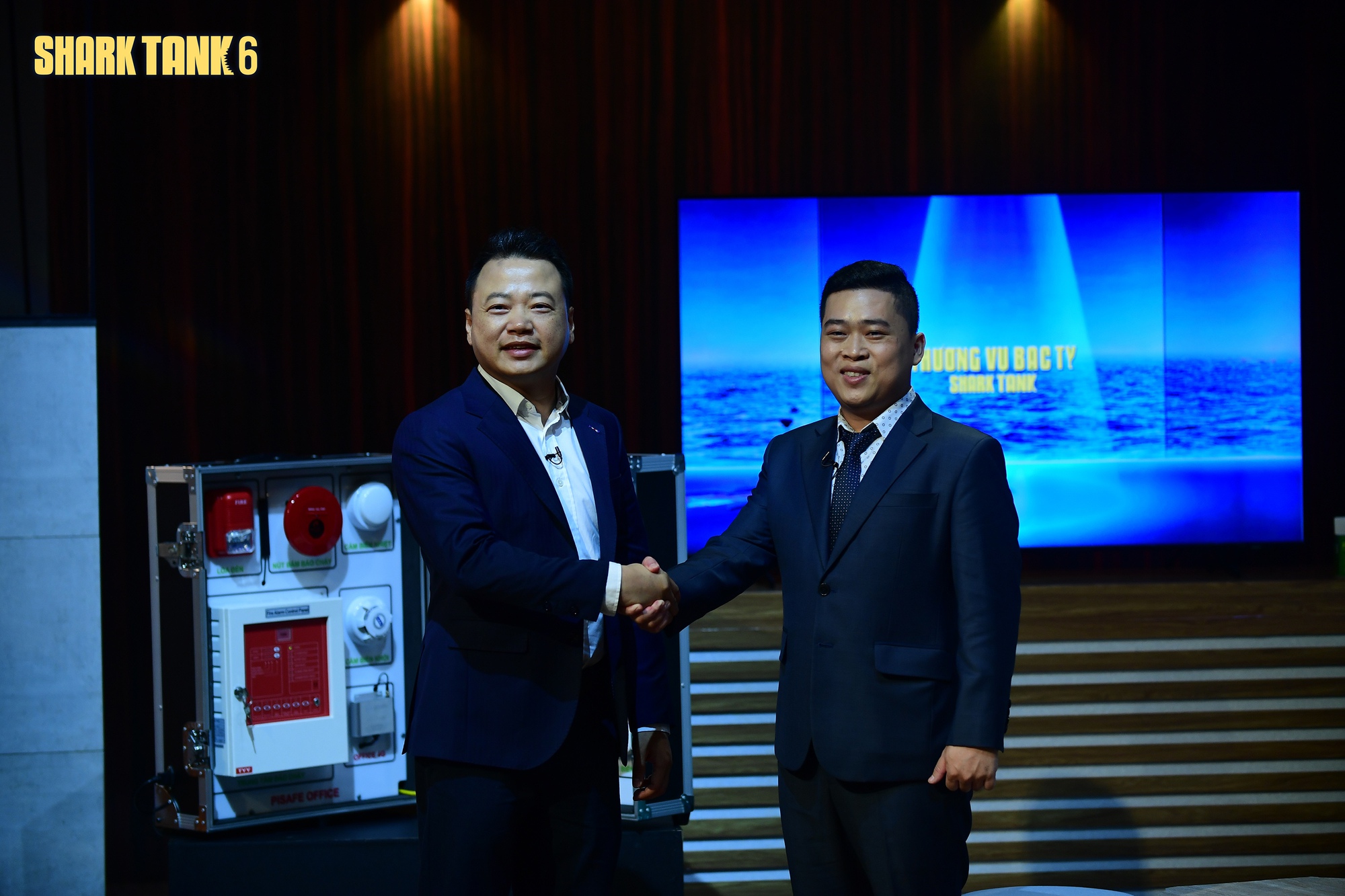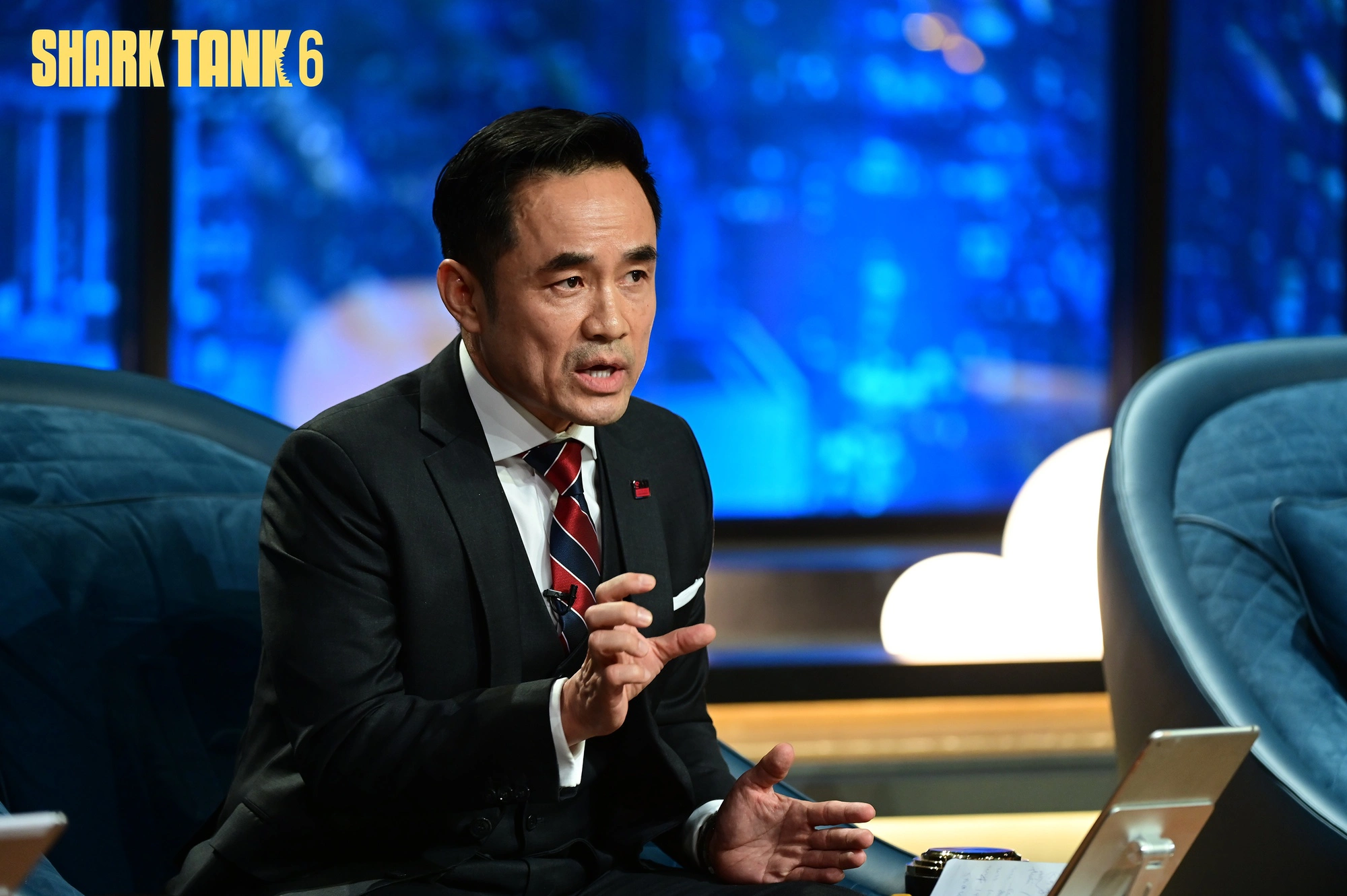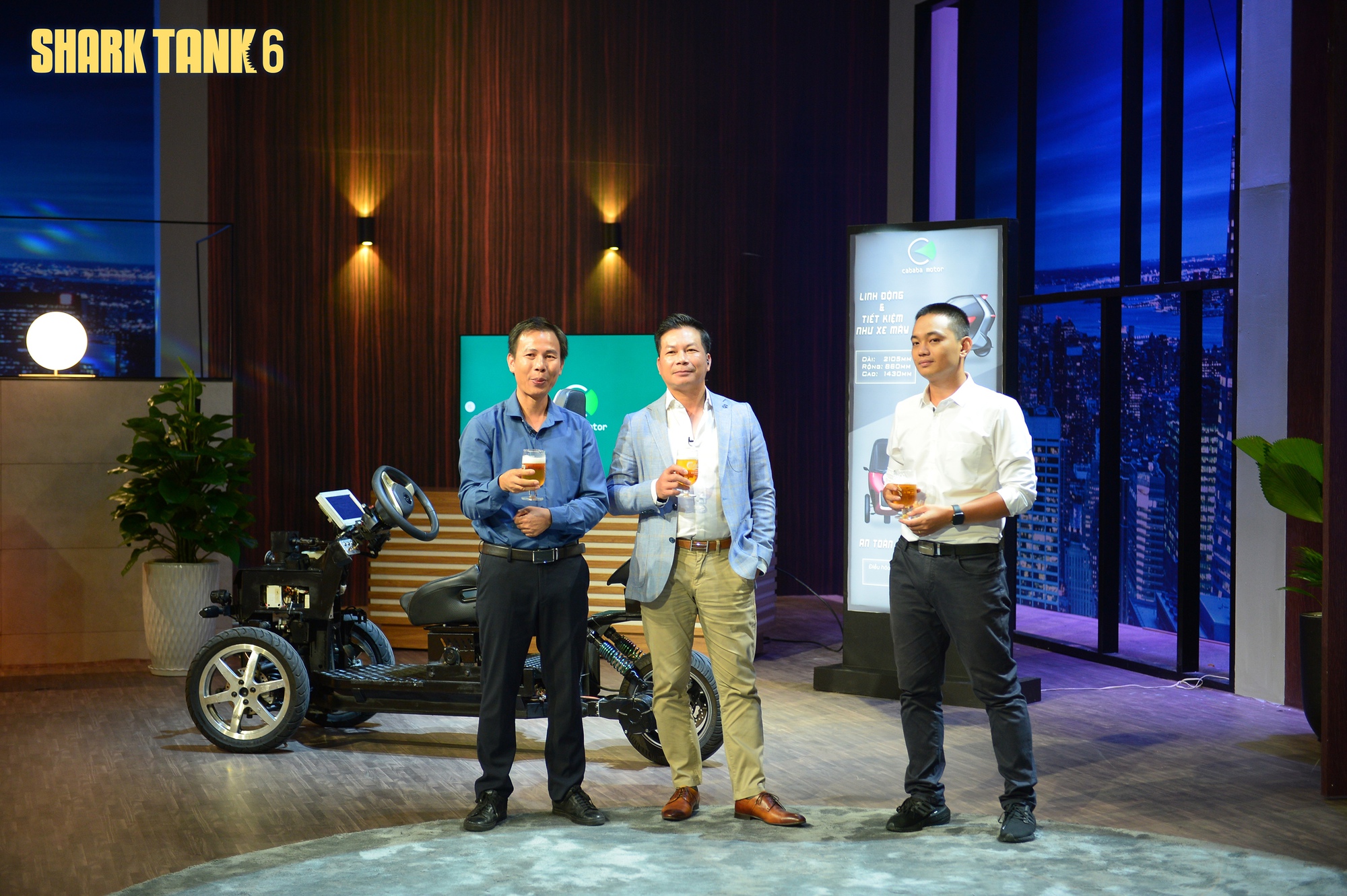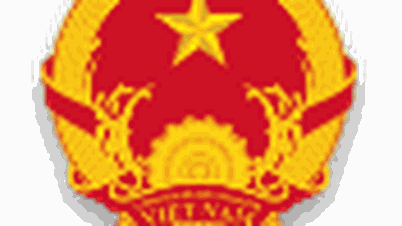Will early fire warning technology become a "national application"?
Shark Tank Vietnam season 6 episode 3 welcomes Tran Xuan Truong - Founder of Pitagon Joint Stock Company. He comes to raise investment in a safety security platform called PiSafe with a mobilization of 250 thousand USD for 10% of shares.

Shark Binh and Tran Xuan Truong - Founder of Pitagon Joint Stock Company and the handshake "worth" 250 thousand USD.
PiSafe provides solutions including hardware and software to help users receive early fire warnings.
When detecting a fire risk, heat sensors, smoke sensors, and fire sensors will send warning information to the homeowner via 4G sim, and at the same time access communication channels with authorities for timely rescue.
Sharing about the financial picture, Tran Xuan Truong said that the company has been operating for 5 years, with a capital contribution of 2 billion VND. The current cash is 5 billion 7, which is the accumulated profit from previous years.
The startup currently has a PiSafe Office product for places where fire alarm cabinets have been installed, such as manufacturing and business establishments, public works, offices, apartment buildings, etc.
PiSafe Home is a product for restaurants, individual businesses, households, and places that do not have fire alarms.
PiSafe started making a profit in 2020 with a figure of 300 million. The figure increased sharply in 2022 with a profit of 2 billion on a revenue of 11.9 billion.
In the first 6 months of 2023 alone, the startup's revenue reached 9.4 billion, with a profit of 2.8 billion.
It is expected that by the end of the year, revenue and profit will be 18 billion and 5 billion respectively.
“We are confident that in the near future we can create more users to participate in the platform. PiSafe is not just a general fire warning platform, but we aim for safety and security.
This will include security monitoring devices for your home as well as for businesses. At the same time, we completely master the IoT (Internet of Things) platform as well as the software. So expanding it is very effective," Xuan Truong convinced the Sharks about the potential to expand the market scale.
Xuan Truong said that the market has about 4 million business households and he can occupy about 1-2% of that number.
“The average selling price of one of our devices for a household is around 3.4-3.8 million. Multiplying that, its capacity will be around 9,000,” Xuan Truong calculated.
With an investment call of 250 thousand USD, equivalent to 6 billion for 10% of shares, Shark Hung assumes that if the startup wants to recover capital by distributing profit dividends, it needs to reach a revenue of 100 billion.




Sharks at Shark Tank Vietnam season 6 episode 3.
All four Sharks refused to invest. Going against the flow with the other four sharks, Shark Binh offered to invest 250 thousand USD in exchange for 40% of the shares.
He believes that startups have a large market because most fires occur in homes and spread from house to house. Instead of selling B2C, startups can sell B2b (B to small B), which means selling to small individual businesses.
Xuan Truong said PiSafe hopes to become a "national application" for safety and security, so the startup is planning to develop new products.
“I propose 250,000 (USD) for 20% or 500,000 (USD) for 36%. At the same time, I require the company to pay dividends every year,” Shark Binh offered a double deal for Xuan Truong to choose from.
After considering the startup's roadmap with many rounds of capital calls, Xuan Truong decided to choose the option of taking 20% of shares in exchange for 250 thousand USD investment from Shark Binh.
"Burning" 2 billion for the dream of making a 3-wheeled vehicle, Shark Binh spoke harshly, Shark Hung invested money
Another production model appearing in episode 3 of Shark Tank Vietnam season 6 is Cababa with two representatives: engineer Nguyen Tuan Anh - Founder and mechanical engineer Tran Quyet Tien - co-founder.
Worried about the sun, rain, dust, noise, and unsafety of traveling by motorbike while taking his daughter to school. In addition, traffic jams, the cost of buying a car, and the waste of space when using a car for only two people, Nguyen Tuan Anh decided to launch the brand Cababa, which is an abbreviation of "Car ba bánh" - meaning three-wheeled vehicle.
The startup’s product is a narrow-body electric three-wheeler with a closed cockpit and air conditioning system, with an expected selling price of 100 million VND. The vehicle is equipped with an active balancing mechanism to overcome the biggest drawback of narrow-body vehicles in general, which is that they are prone to tipping over when cornering.
The three-wheeler can travel 200km on a single charge with the battery version attached to the body of the vehicle or 150km with the removable battery version. Currently, the startup has an MVP (Minimum viable product) version that has been tested for 6 months.

Shark Hung and the startup had an argument about a 3-wheeled vehicle. Tuan Anh and Quyet Tien wanted to call for investment of 1.8 billion VND for 5% of shares to create 5 more products within 6 months.
Tuan Anh shared that Cababa's vision by 2030 is to be the number one company in Southeast Asia in the field of micromobility (small-sized vehicles). This project has spent 2 billion, including 1 billion from the founding team and 1 billion in loans.
Tuan Anh and Quyet Tien want to call for investment of 1.8 billion VND for 5% of shares to create 5 more products within 6 months.
Shark Binh was the first to decide not to invest. He said: “Shark Tank is a playground for business, feasible business projects that generate revenue and immediate profits. It is not a playground for dreams.” That is why he refused to invest.
Shark Hung Anh believes that market thinking is difficult to change, so he advises startups to expand other people's paths instead of opening a new path themselves. He decided not to invest.
Shark Tue Lam said that she had received Cababa's pitch deck and also tried to understand consumer tastes.
“I asked other people if they had 100, 120 million right now, would they want to buy a SH or would they want to buy a car like this, and all 10 of them told me that they would not buy a car like this.” For that reason, she did not invest in this startup. Shark Louis was the next person to say no.
The argument between Shark Hung and startup
"So now do you call it a car or a motorbike?", Shark Hung wondered.
Tuan Anh said: "Many people asked me that question and I answered that it's not a car, not a motorbike, it's something from the future."
"If the inspection company asks you, how do you answer?"
Shark Hung raised the issue and analyzed that, if the vehicle is defined as a three-wheeled car, the user needs a driver's license, the vehicle can participate in the car lane and the driver does not have to wear a helmet.
From another perspective, Shark Hung believes that in the near future, Vietnam will have car models priced around 100 million and 200 million. At the same time, he appreciates the dedication of the founding team in researching and developing the product in a short time. Shark Hung wishes to accompany the startup.
“You just put down about 2 billion, I put down 1.8 billion, giving me 5% is a bit too little “fish”.
So you put down 2 billion, you keep 85%. I put down 1.8 billion, I take 15%.
Maybe I will advance you about one or two hundred million for you to 'live' first, to do a few things first. But the official disbursement must be after there is significant progress in registration and circulation procedures," Shark Hung said.
Finally, Shark Hung decided to invest 1.8 billion for 12% of contributed capital shares, 3% are free shares (gifted shares). Tuan Anh agreed to this proposal of Shark Hung, successfully closing the capital calling deal.
Young actress Gia Linh calls for capital, "sharks" turn their backs
Young actress Gia Linh said that besides her work as an actress, she also tried many business ventures but most of them failed due to lack of experience.
“My mother advised me that I was still very young, my failures and mistakes were lessons and she would always be with me. That was the inspiration for me to return to my hometown to join hands with my mother, creating a brand named after her,” Gia Linh said about the reason why the Thuy Lieu Sun-dried Beef brand was born.

Gia Linh and her mother came to Shark Tank Vietnam season 6 to call on the Sharks to invest 2.5 billion in exchange for 20% of shares.
Wishing to develop a stronger brand in a more professional direction, pursuing the right ideology: Pure quality, clean from the green heart, Gia Linh and her mother came to Shark Tank Vietnam season 6 to call on the Sharks to invest 2.5 billion in exchange for 20% of shares.
In 2022, Thuy Lieu Sun-dried Beef brand achieved revenue of 12 billion, profit of 12%. Revenue in 2023 up to now is 8 billion, expected profit will reach 15% thanks to optimizing production and reducing operating costs.
Of which, 30% of the capital will be invested in equipment such as dryers, technological date printers, production lines, cold storage, and drying ovens. The next 30% will be used to open an official facility in Tuy Hoa city, Phu Yen province.
“According to my research, in 2022 Phu Yen had 2.2 million tourists and by 2023, at the beginning of this quarter, nearly 500,000 people had visited. It was 3-4 times higher than the same period last year... If I fully exploited Phu Yen province, I would have a market that I could exploit. Once I opened a facility, I would use that cash flow to buy fresh beef for storage,” Gia Linh analyzed the market potential. However, the Sharks all refused to invest.
Source


![[Photo] Top players gather at the 2025 Nhan Dan Newspaper National Table Tennis Championship](https://vphoto.vietnam.vn/thumb/1200x675/vietnam/resource/IMAGE/2025/5/23/9ad5f6f4faf146b08335e5c446edb107)




























































































Comment (0)